Bridges of Budapest
https://www.youtube.com/user/DynamoMagician/videos?view=0https://www.youtube.com/user/DynamoMagician/videos?view=0
Update in progress but you can click on me in the text if you dare
LÄNKAR
https://www.youtube.com/watch_popup?v=KcuDdPo0WZk
Http://www.youtube.com/embed/eSKCi9ml4ME
https://www.youtube.com/embed/mcbHKAWIk3I
http://www.oddcast.com/home/demos/tts/tts_example.php?sitepal
Rolling Stones
http://www.rollingstone.com/music/lists/100-greatest-guitarists-20111123/alex-lifeson-19691231
https://www.youtube.com/watch_popup?v=r4B9 0Knx57w
Julsidor
http://www.burkar.nu/so/julsida.htm
Faktabanken
ungfakta
Pluggakuten
htt
https://www.youtube.com/user/DynamoMagician/videos?view=0
Petöfi Bridge
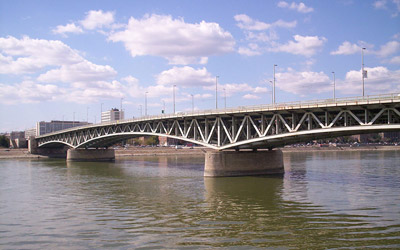
Petofi Bridge (Petofi híd) named after the revolutionary poet, Sándor Petofi, is possibly the least inspiring of all the Budapest bridges.
It links with Margaret Bridge right round at the other end of the Grand Boulevard, which rings Pest. Until 1945, the bridge was named after Miklós Horthy, Hungary's right wing leader and "admiral without a sea".
Liberty Bridge
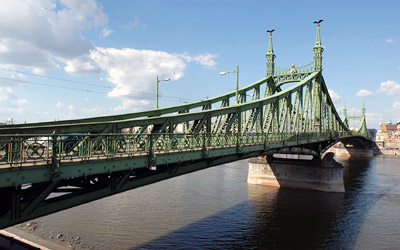
Liberty Bridge (Szabadság híd) was built in 1894, and was opened by Emperor Franz Joseph in 1896 as part of the monumental series of ceremonies organized to commemorate the 1000th anniversary of the arrival of the Magyars in the Carpathian Basin. Most bridges in Budapest are named after a person and the Liberty Bridge was called Franz Joseph (Ferenc József) after the Emperor. On the top of each pillar is a Turul - the mythical Hungarian bird standing on a golden ball.
Arpad Bridge
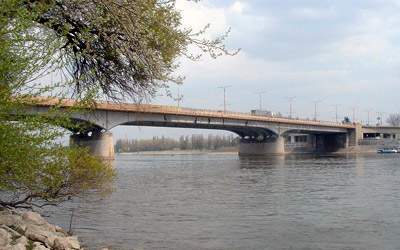
Arpad Bridge (Árpád híd) named after the leader of the seven tribes of Magyars who rode into the Carpathian basin in the 9th century, is the second longest and busiest of the Budapest bridges.
The authorities decided in 1939 that workers from Óbuda should be able to move more easily to the Angyalföld district and that a bridge was needed.
However, the work was held up by the war, and the bridge was not finished until 1950 when it was named Stalin Bridge.
Chain Bridge
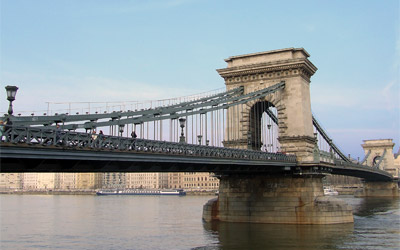
Chain Bridge (Lánchíd) was the first permanent bridge between Pest and Buda, and the second permanent bridge on the full length of Danube. The bridge was completed in 1849 by the supervising of architect Adam Clark. It has since rightly become a symbol of Budapest, the most known bridge of the Hungarian capital.
The oldest, indisputably most beautiful and certainly the most photographed of Budapest's bridges, floodlit at night.
Elisabeth Bridge
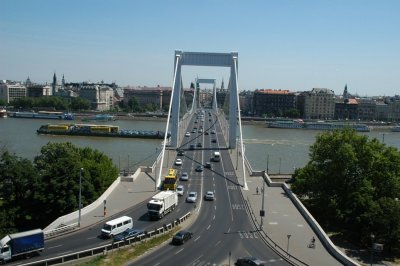
Elizabeth Bridge (Erzsébet híd) bears the name of Queen Elizabeth, the queen very much liked by the Hungarians. That was the fourth bridge built, following the Chain Bridge, Margaret Bridge and Franz Joseph Bridge (now called the Liberty Bridge).
Originally it was a chain structure bridge like the Chain Bridge, built in eclectic style, completed in 1903. All the bridges were blown up by retreating German troops in 1945, and the old bridge was unrepairably damaged. A modern elegant white suspension bridge was built instead in 1964 with six lanes of traffic.
Lagymanyosi Bridge
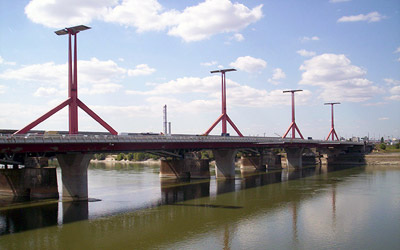
Lagymanyosi Bridge (Lágymányosi híd) looks like a kind of red toast rack, is the most southern of all the bridges. It was opened in 1995 and has special giant mirrors which light the road evenly from 35 meters high. On the Pest side the National Theatre was built between 2001 and 2002.
Margaret Bridge
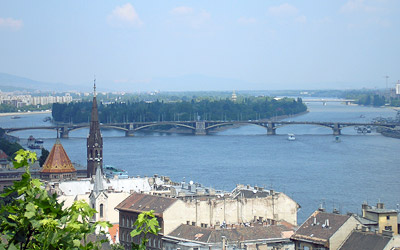
Margaret Bridge (Margit híd) was the second permanent bridge in Budapest, it was built between 1872 and 1876 by French engineer Ernest Gouin's company Societé de Construction des Battignolles. There is an embranchment from the middle pillar onto Margaret Island.
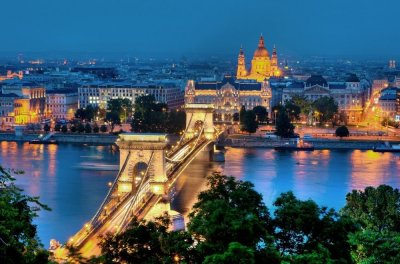
Chain Bridge
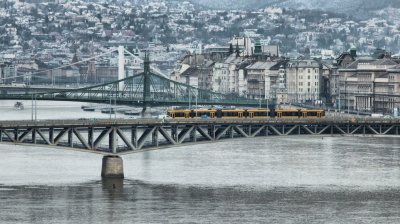
The Bridges Budapest
https://www.youtube.com/user/DynamoMagician/videos?view=0
https://www.youtube.com/user/DynamoMagician/videos?view=0